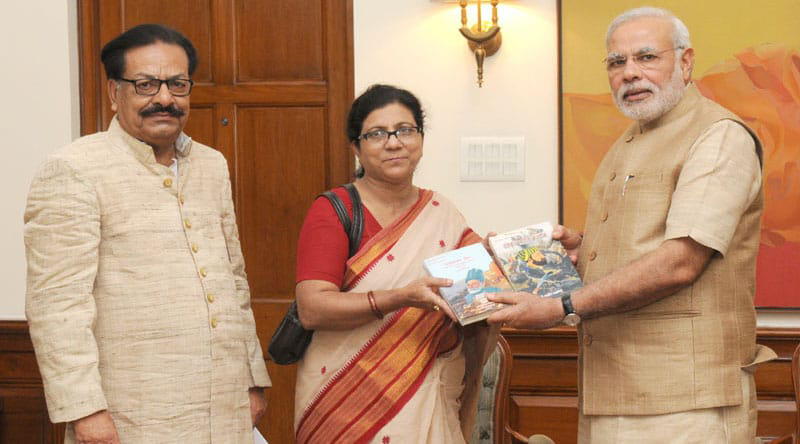
Naheed Abidi, the author who impressed Modi, Kalam with her Sanskrit brilliance
Naheed Abidi, probably the first Muslim woman to work as a lecturer in Sanskrit, who even received acclaim from Prime Minister Narendra Modi, didn't have an easy start to her career. Initially, she had difficulty finding a job and often left academicians wondering about her 'unusual' subject choice.
Abidi was born in 1961, into a Shia Muslim landlord family in Mirzapur in Eastern Uttar Pradesh. Choosing Sanskrit as his subject, Abidi completed her graduation from the Kamala Maheshwari Degree College. She later completed her master's from Mirzapur's KV Degree College.
After her marriage with lawyer Ehtesham Abidi, she moved to Varanasi. She continued her literary journey and earned a Ph.D. from Mahatma Gandhi Kashi Vidyapeeth (MGKV). Her thesis during the 1993 doctorate was titled 'Vedic Sahitya Mein Ashviniyon Ka Swaroop' (The Form of Ashvinis in Vedic Literature).
In 2005, Abidi started working as a lecturer at Banaras Hindu University without any salary. Soon after, she joined Mahatma Gandhi Kashi Vidyapeeth to work as a part-time lecturer on the daily wage scheme.
Her first book was published in 2008 and was titled Rahim in Sanskrit Literature – an account of the Sanskrit leanings of the famous poet Abdul Rahim Khan-e-Khana. This was followed by Devlayasya Deepa, a translation of the Charag-e-Dair by poet Mirza Ghalib. She then went on to pen her third book titled Sir-e-Akbar, a Hindi translation of 50 Upanishads, first written by the Mughal prince Dara Shikoh. She has also published a Hindi translation of Vedanta, which has been translated into Persian by Shikoh.
“It is the soil of Banaras that attracts people of all religions, and I am fortunate to belong to this great place,” she says of Ghalib.
“Through my work on Rahim, I want to tell people that he (Rahim) had great respect for Sanskrit and Hinduism,” she says.
Naheed Abidi lives with her husband Ehtesham and their two children, a son and a daughter in the VDA Colony in Varanasi's Shivpur area. She also serves as a member of the Executive Council at Sampurnanand Sanskrit Vishwavidyalaya.
Despite her ill health, she devotes eight hours a day to her study and writing.
“Though I did not take admission in any college or university, I have been teaching Sanskrit voluntarily since 1994 in several institutions including Banaras Hindu University and Mahatma Gandhi Kashi Vidyapeeth,” says Abidi. "Spreading the light of education is the greatest virtue in Islam," she says.
Abidi is doing what Dara Shukoh, the eldest son of Mughal emperor Shah Jahan, had done in Varanasi centuries ago. It is the magnetism of Sanskrit and Vedic tradition that inspired the Mughal prince to learn the language from the pundits of Kashi. It is recorded in the District Gazetteer of Varanasi that Dara Shukoh translated the major Upanishads into Persian under the title 'Sirr-i-Akbar' with the help of local pundits in six months in 1657.
.jpg)
Abidi's creative talent had also impressed the then President APJ Abdul Kalam, who invited him to the Rashtrapati Bhavan in 2007. He also presented a book to Kalam.
Naheed Abidi was awarded the Padma Shri in 2014 by the Government of India for her service in the field of literature. “Granting me the Padma Shri award is an honor to the Sanskrit world and it will inspire Muslims to learn Sanskrit. I am deeply grateful to the Sanskrit and Persian scholars who encouraged me in my aim of bridging the bond between the two religions. done. Sanskrit is a rich language, which has the quality of promoting harmony and peace in the society," she adds.
She has also been awarded DLIT (Honoris Causa) by the University of Lucknow. Abidi met Prime Minister of India Narendra Modi at his residence in 2014 and presented two books written by her. Modi announced the meeting via a photograph on his Google Plus page and the video of the meeting was displayed on the Prime Minister's personal website. In 2016, she was honored with the Yash Bharti Award by the UP government at a function held in Lucknow.
Abidi credits both her paternal family and in-laws for her success and her literary education. “Our families have an eclectic outlook and we believe in a peaceful coexistence,” she says while showing a century-old handwritten book, an Urdu translation of the Bhagavad Purana. "This book has been with our family since 1903," she said.
She is also proud to be a good mother. "I didn't opt for any service to give time to my two children—a son and a daughter—who are pursuing higher education in engineering," says Abidi.
Support Our Journalism
We cannot do without you.. your contribution supports unbiased journalism
IBNS is not driven by any ism- not wokeism, not racism, not skewed secularism, not hyper right-wing or left liberal ideals, nor by any hardline religious beliefs or hyper nationalism. We want to serve you good old objective news, as they are. We do not judge or preach. We let people decide for themselves. We only try to present factual and well-sourced news.







